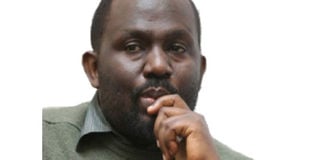Besigye, Bobi, and Uganda in 2021: what Museveni fears – and doesn’t

Author, Charles Onyango Obbo.
In December last year, the Inter-party Organisations (Ipod) finally got underway with four of Uganda’s parties: The ruling NRM, the Uganda Peoples Congress (UPC), the Democratic Party (DP), and Justice Forum.
Notably absent was the main Opposition party Forum for Democratic Change (FDC), which boycotted the talks. The poisoned political atmosphere of 2018, especially the savage brutalisation of MP and musician Bobi Wine (Robert Kyagulanyi) and his People Power supporters, and the suppression of his music performances, started to ease.
Talk of electoral and political reforms ahead of the 2021 election, now that President Yoweri Museveni had pocketed the constitutional amendment removing the 75-year age limit, allowing him to keep running, picked up. And then, from February 19 this year, things changed.
The NRM politburo, Central Executive Committee (CEC), has endorsed Museveni as its sole presidential candidate for the election of 2021.
Barely a month later, on March 17, the NRM Parliamentary Caucus also endorsed Museveni as the party’s sole candidate in 2021. Something strange also happened in Opposition ranks. Some of the parties in Ipod turned on Besigye as the main enemy, and started demanding that he should step aside for other politicians.
Besigye has stood unsuccessfully against Museveni four times, and it would be reasonable to request that he shouldn’t stand again.
But the Ipod Opposition are actually aren’t doing that. Though he remains a power behind the throne in FDC, Besigye doesn’t hold any formal position, so it seems not to make sense to ask him to “step aside”. From what? Ah, that is where it gets interesting. His fellow Opposition rivals want him to quit any political involvement, including canvassing for his party.
With the Opposition doing Museveni’s work for him, ordinarily you’d think he would let their contradictions play out. He didn’t. If Museveni seemed like he was taking his boot off the necks of the Opposition early in the year, just over a fortnight ago all that ended. The police took to switching off local FM stations around the country whenever former FDC presidential candidate Kizza Besigye and FDC stalwarts were on air, and in instances beat and arrested some of them.
And then the bans on Bobi Wine’s music performances returned on the Easter weekend, and he was arrested for good measure. We were back into Uganda’s medieval political cave.
While they might seem disjointed, all these events are connected.
For starters, it seems that unlike previous times when popular uprisings and protests ousted Africa’s club long-ruling leaders, of whom Museveni is now a proud senior member, this time the Uganda leadership is responding.
The first Ipod meeting, attended by the president, took place the same month when the protests against the increase in the price of bread and a range of economic woes started in Sudan against Omar al-Bashir’s regime.
Though the uprising in Sudan was the closest to home for the Uganda leadership, al-Bashir was already damaged goods, and had endured several protests and challenges over the years. He could be discounted.
But the Algerian protests, dubbed the Smile Revolution, against the ailing Abdelaziz Bouteflika, which began on February 16, were different. We will return to both next week.
Kampala seems to have decided that the best response is to crack down harder, not to reform. These, therefore, are the scenarios that are likely to play out. It is unusual for a political party, even the Chinese Communist Party, to lock down the sole candidate thing two years ahead. The NRM has done it earlier than any ruling party in the world.
This is likely because: (a) there will be no NRM convention to elect Museveni as a flagbearer in late 2020; (b) if there is, there will be no elections in 2021, and they will be postponed to 2022 or 2023.
However, there will be a “transition process” in its place, involving a constitutional amendment probably to move to a parliamentary system. The end to the crackdown on the Opposition will be one of the things to emerge out of Ipod, and in exchange for it, the Opposition parties will have to support – and even be part of - the “transition process”.
The problem is that FDC, and particularly Besigye, is not part of it. Since he’s unlikely to support any such transition, Besigye needs to be removed from politics as a whole.
For NRM and Museveni, Bobi Wine and Besigye present different types of problems. Bobi Wine has been the most successful at channeling the grievances of young Ugandans, especially in the urban areas. Besigye and the FDC dominate in the alternative ideas and policy space.
Grievances can be resolved without ceding power. Policy and philosophical contests almost can’t be resolved without ceding power. But what is power in the present Uganda context, and who really holds what? We have some surprises on this too next week.
Mr Onyango-Obbo is the publisher of Africa data.
visualiser Africapedia.com and explainer site. Roguechiefs.com. Twitter@cobbo3




